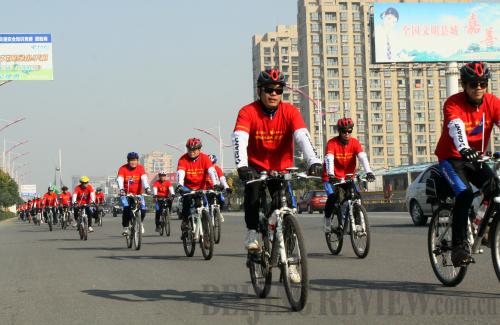|
 |
|
CAR-FREE DAY: Members of a local environmental NGO in Jiashan, Zhejiang Province participate in a bicycling campaign on November 11 to promote low-carbon lifestyle (HU LINGXIANG) |
Friends of Nature, Global Village of Beijing and Green Home are China's pioneering environmental NGOs that have taken on a new role in climate change advocacy. In recent years, the Chinese Civil Climate Action Network and the China Youth Civil Climate Action Network were established for the purpose of combating climate change.
At its inception, Friends of Nature, founded in 1994, focused on biodiversity conservation and environmental education. It started to be concerned with climate change in 2006, when the Chinese Government became more active in mitigating it, said Dou.
In early 2007 Friends of Nature, together with eight other NGOs including Global Village of Beijing, Green Home and Green Peace, launched a project titled "Chinese Civil Society's Responses to Climate Change."
The project team surveyed more than 200 grassroots environmental NGOs in China on what they had done to tackle climate change and solicited opinions on what society should do. The team conducted studies and produced a report.
While some grassroots NGOs often commit to nationwide initiatives, others focus on sector-wide or local efforts.
Rising voice
Xie Zhenhua, head of the Chinese delegation to the Cancun climate change conference, met with representatives of Chinese NGOs several times shortly before and during the conference, praising them for their roles in pushing forward climate change negotiations and serving as a bridge between the government and the public. Xie is also vice minister of the National Development and Reform Commission.
Early in October in north China's Tianjin, China's environmental NGOs made an unprecedented presence at a preparatory round of climate talks for the Cancun conference.
They published their position paper titled "Green China—Racing to the Future," which was signed by more than 70 NGOs operating in China.
The position statement calls on nations across the world to confront the challenge of climate change and negotiate a fair and effective agreement as soon as possible.
At the climate talks in Tianjin, more than 60 participating Chinese NGOs also organized 20 side events.
NGOs play an important role in raising Chinese people's awareness of climate change, and engaging them in combating climate change, said Lu Sicheng, the China national coordinator of these events.
Lu is secretary general of Alashan Society of Entrepreneurs and Ecology, an environmental NGO that was set up in 2004 by well-known Chinese entrepreneurs.
In 2004, six NGOs in China announced an initiative calling on the public to set air conditioners at 26 degrees Celsius in summer to mitigate climate change and reduce air pollution. More than 40 NGOs joined the effort.
This call was backed by the government. In 2007, the State Council of China released a notice demanding all air conditioners in public places to stay above 26 degrees Celsius in summer and no higher than 20 degrees Celsius in winter.
In 2005, the Global Village of Beijing, Friends of Nature and the China Environmental Culture Promotion Association initiated a Car-Free Day. This call has been followed by many NGOs, which proposed more green solutions, including low-carbon outings such as taking public transportation, riding bicycle and walking.
In July 2007, Friends of Nature and the Global Village of Beijing spearheaded a campaign to mobilize the public to cut their energy consumption by 20 percent, along with two international NGOs—World Wildlife Fund and the Energy Foundation.
Forty NGO partners from China's 17 provinces and municipalities later joined the campaign in advising the public on energy conservation at home and in their daily lives.
In 2010, Friends of Nature studied bicycle parking and bicycle sharing facilities along Beijing's subway routes and publicized the Beijing Bicycling Map.
In addition to promoting mitigating actions, environmental NGOs have also actively been involved in climate-related disaster relief work and in advising local communities of adaptation measures.
For instance, when southwest China was hit by the worst drought in the past century in 2009, Green Watershed, an NGO based in Yunnan Province, helped villagers in Lashihai County set up a water management group to coordinate efficient and fair irrigation water use.
Despite recent success, many NGOs face problems including insufficient funds and personnel and weak organization ability in their development process, the All-China Environment Federation said.
"Although in some cases environmental NGOs have successfully promoted the public and government to make changes, Chinese NGOs' day-to-day activities are not sufficiently solid," Lu recently told chinadialogue.net, an independent, non-profit organization based in London, Beijing and San Francisco.
Not enough was done to bridge the gap between public participation and policy advocacy, and many NGOs do not have statistics to evaluate the effect of their programs, Lu said.
"The ability of Chinese NGOs to participate in climate negotiations is still very weak. These organizations need to study the negotiation process. There's a lot of learning to do and they can't expect to have any influence without putting in the time," Lu said.
Major Grassroots Environmental NGOs in China
Friends of Nature
Founding time: 1994
Website: http://www.fon.org.cn/
Greenriver Environmental Protection Association
Founding time: 1994
Website: http://www.green-river.org/Index.html
DAO Institute for Environment and Development
Founding time: 1994
Website: http://www.ied.org.cn/index_html?set_language=en&cl=en
Global Environmental Institute
Founding time: 2004
Website: http://www.geichina.org/index.php?controller=Default&action=Index
SHAN SHUI Conservation Center
Founding time: 2007
Website: http://www.hinature.cn/Landscape/
China Youth Climate Action Network
Founding time: 2007
Website: http://www.cycan.org/Category_33/index.aspx
| 